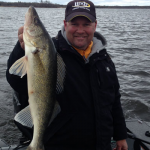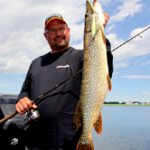By Brad Wiegmann
It’s scary how successful some anglers are at fishing with a football jig. Not only do they catch stringers of quality bass, but big ones too. However, they just don’t cast it out and hope a bass will strike it.
Football jigs unlike other jigs are designed to be dragged across the bottom imitating forage scooting or fleeing away from a predator. “Football jigs catch bass year round. Any time you have a gravel or rocky bottom they are going to produce big stringers of bass,” said FLW Tour and Bassmaster Elite Series professional angler Matt Herren from Trussville, Alabama.
“A great example where I catch big stringers of bass with football jigs are on TVA reservoir shell beds. I will fish them during the prespawn and focus on 8- to 10-feet of water depth. That may sound shallow for fishing a football jig, but the bass are staging there before moving in really shallow to spawn,” said Herren.
“Once you get to postspawn and in to summer, I may fish up to 35 feet deep with a football jig. That’s where the bass are staging and so your jig needs to be down there to catch them,” said Herren.
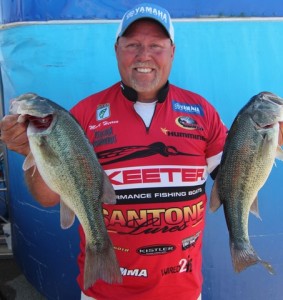 Herren uses two different style Santone Lure football jigs when fishing for bass. “It all depends on the condition and what I’m fishing for when it comes to selecting the right style football jig. When I’m fishing for spotted or smallmouth bass, the M-Series Football Jig with it’s 5/0 super sharp medium wire hook is perfect for catching them. On the other hand, the Pro Football Jig with it’s 5/0 super sharp flipping hook is better when you need a bigger, stronger hook to land big bass,” said Herren.
Herren uses two different style Santone Lure football jigs when fishing for bass. “It all depends on the condition and what I’m fishing for when it comes to selecting the right style football jig. When I’m fishing for spotted or smallmouth bass, the M-Series Football Jig with it’s 5/0 super sharp medium wire hook is perfect for catching them. On the other hand, the Pro Football Jig with it’s 5/0 super sharp flipping hook is better when you need a bigger, stronger hook to land big bass,” said Herren.
“For example, I like to fish the M-Series Football Jig on Kentucky Lake. It has a population of both smallmouth and largemouth. The longer length of the 5/0 regular wire hook helps with increasing the hook up ratio when fishing where they both are feeding.”
Typically, Herren will use a 3/4-ounce M-Series Football Jig that has a peanut butter and jelly colored skirt rigged with a twin-tail Gary Yamamoto, Zoom Super Chunk or a Reaction Innovation Sweet Beaver for a trailer. He likes to target 8- to 20-foot drops when fishing with this combination.
“However, everything changes when you get to reservoirs like Falcon down in Texas. You need the bigger, stronger hook the Santone Lures Pro Football Jig has to catch and land bass that grow to 10-, 11-, or 13-pounds.
Most of the time, Herren will fish a 3/4- or 1-ounce Pro Football Jig around the rock piles or wood on Falcon. He like blacks, green pumpkin or bass candy for color patterns of his skirts. As for a trailer, Herren admitted the new Reactions Innovations The Twerk will be the bomb down there. “The claws on The Twerk stand up in a fighting position and incites bass to strike it,” said Herren.
Renowned in the bass fishing community for his expertise as one of the best football jig anglers, Herren played a big part in the design of the M-Series Football Jig, in conjunction with Brian Branum and Santone Lures.
Once he knows what species of bass are prevalent in the body of water he’s fishing, Herren believes selecting the weight to be the next most critical aspect to selecting the right football jig. “Anytime I’m fishing in 10- to 20-feet of water, I normally use a 1/2- or 3/4-ounce football jig, but if it’s windy or there is lots of current, I may go to the next heavier size to keep it dragging along the bottom. Once the depth gets around 20- to 30-feet or deeper, I will use the 1-ounce football jig,” said Herren.
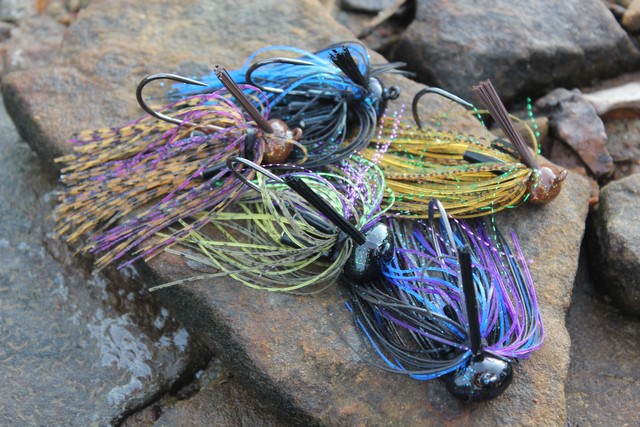
He noted on special lakes or when trying to get a reaction bite the heavier football jig is better. “Sometimes a football jig falling fast or disturbing the bottom will get a reaction strike when the lighter weight ones don’t,” Herren continued, “you just have to experiment with the weight. I always pay attention to where the hook is located when I catch one. If it looks like they tried to swallow it then you have the right size one on.”
Speed of retrieve is vital when it comes to getting bites on a football jig. Herren agreed and noted the best presentation with a football jig is to drag it. He never hops it.
“I want it to just swim along the bottom. Football jigs have their own walk-the-dog kind of action as they bounce off the bottom swimming along.”
When it comes to what color football jig to fish with Herren keeps it simple believing location is more important. Most the time it’s black/blue, peanut butter and jelly or bass candy no matter where he is fishing across the United States. Like other professional anglers, Herren will normally match the trailer to the skirt color pattern.
Having the right rod, reel and line combination is also important when it comes to hooking and landing bass noted Herren. Herren uses a Kistler Z-Bone medium/heavy action 7 foot, 6 inch rod. “You want a rod with a power rating of 4- or 5-power, but it must have a parabolic action and the right tip action to allow for a good hook set,” said Herren.
Not surprisingly, Herren is particular about how he sets the hook when fishing with a football jig. “I never do a snap set when setting the hook. Instead, I reel down and do a sweep set pulling the hook into the bass,” said Herren.
As for line, Herren uses 12- to 16-pound Gamma Fluorocarbon fishing line when in open water situations, but will change to 20 pound test Gama Fluorocarbon fishing line when in Texas or around big bass.
Becoming a better football jig angler comes down to paying attention to the little things. Is your football jig heavy enough to swim along the bottom, do you have the right style of trailer on, should you use a strong hook or medium wire hook, what kind of hook set are you doing or are you using the right combination of rod, reel and line? Putting it all together will increase not only the number of bass you are catching on a football jig, but also the size.
![]()
Brad Wiegmann
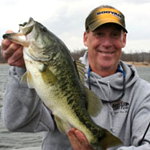
Online Contributor
Brad Wiegmann just wants to fish, but his wife told him to get a job so he works as a freelance outdoor writer and photographer when not fishing. Brad has written for countless magazines and websites, and been featured, which includes Arkansas Sportsman, Southern Outdoors, Outdoor Life, and Bassmaster. Besides being a freelance outdoor writer and photographer, Brad also has his own award winning website www.BradWiegmann.com.




